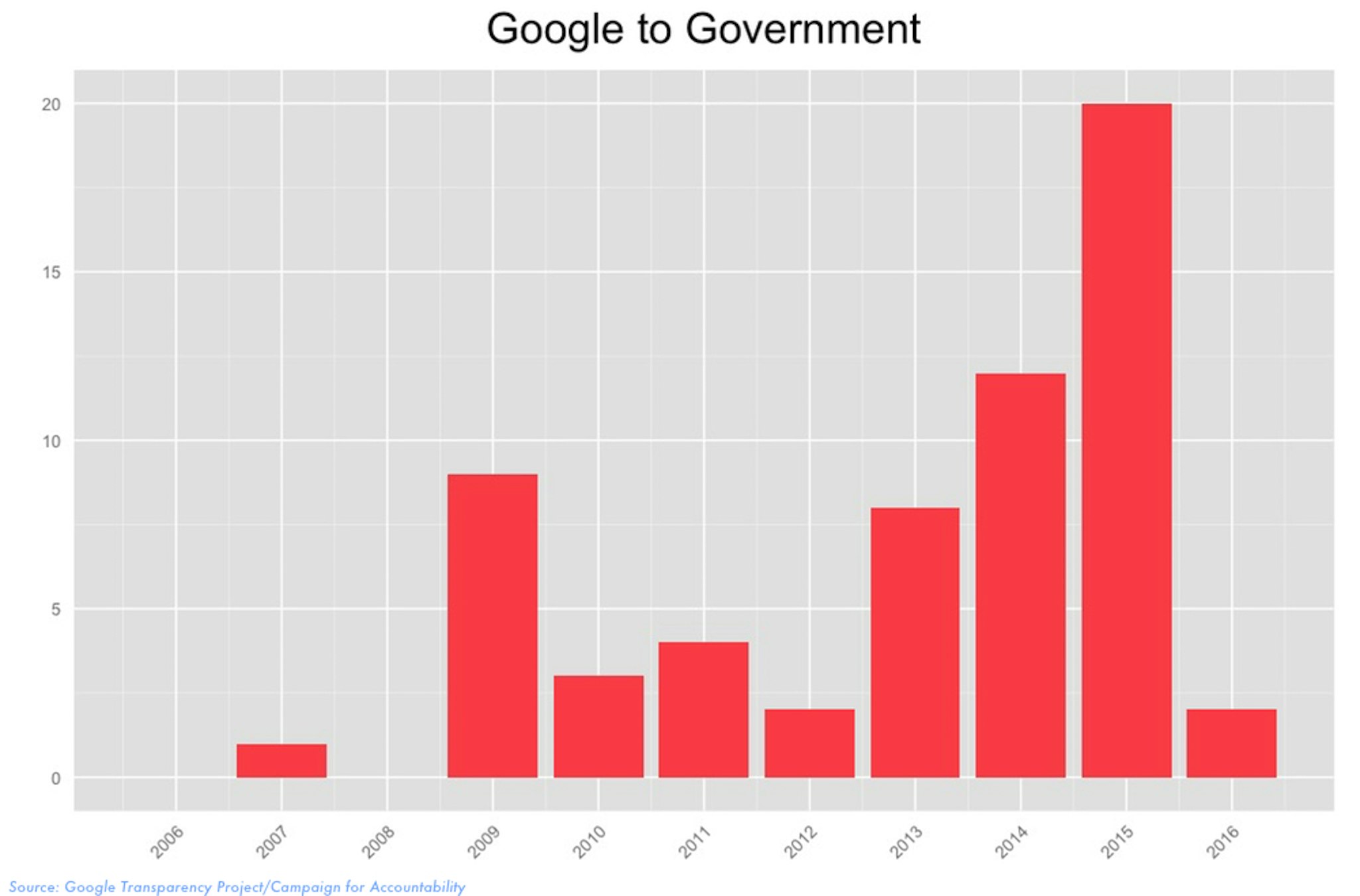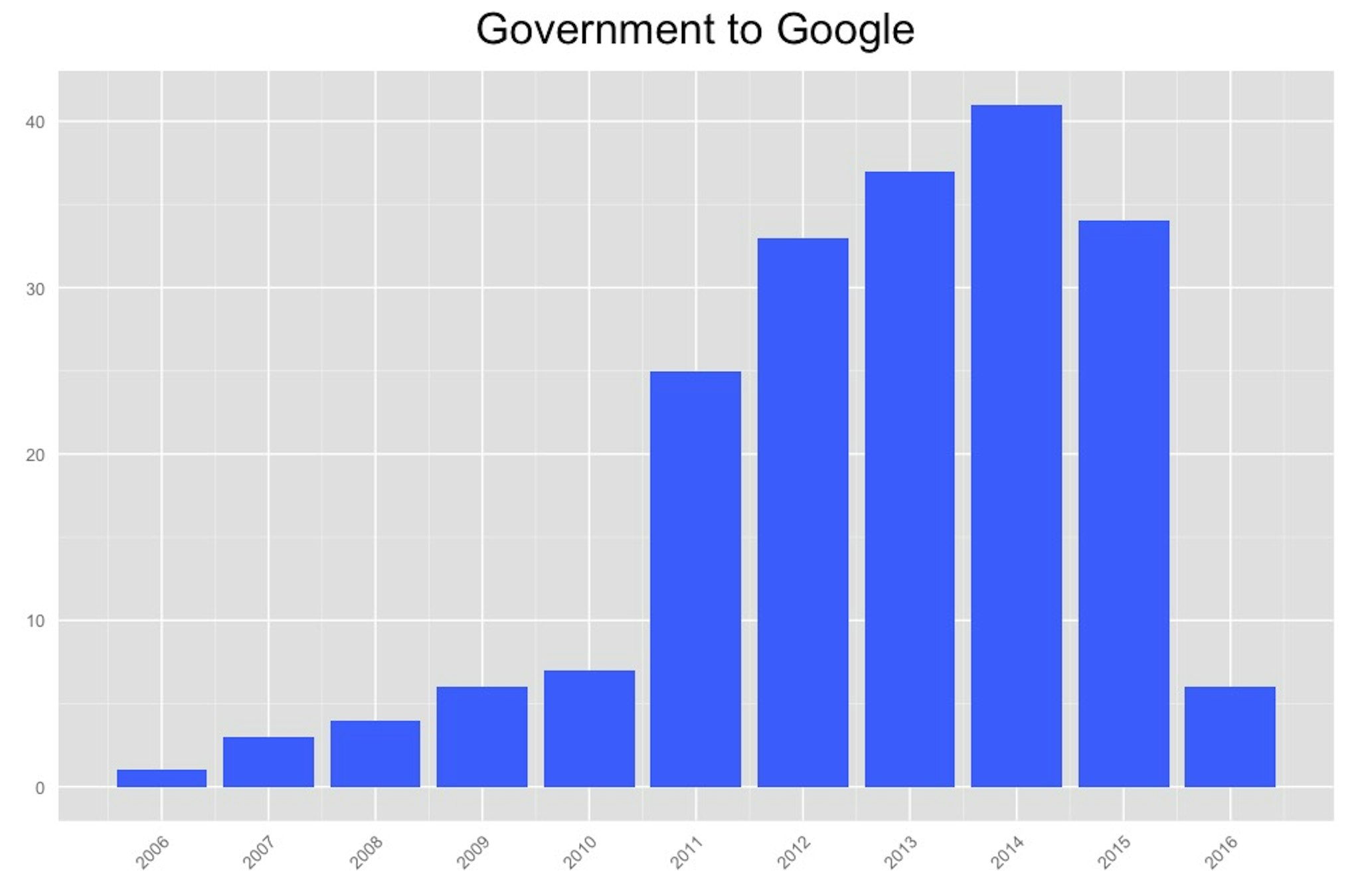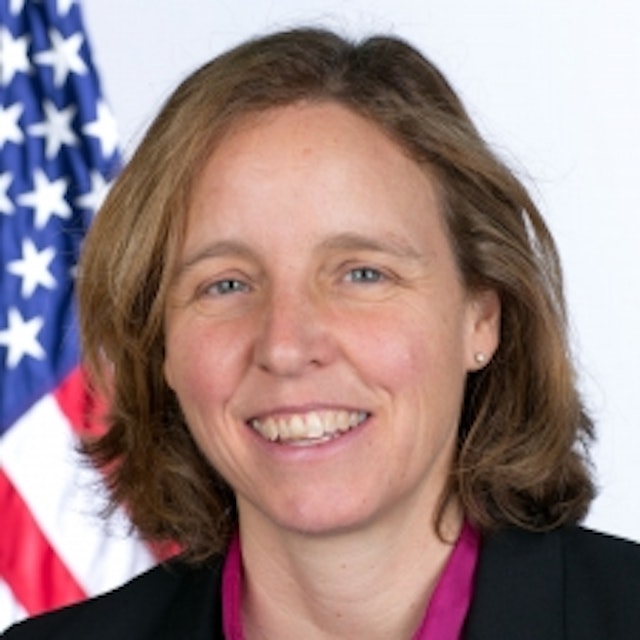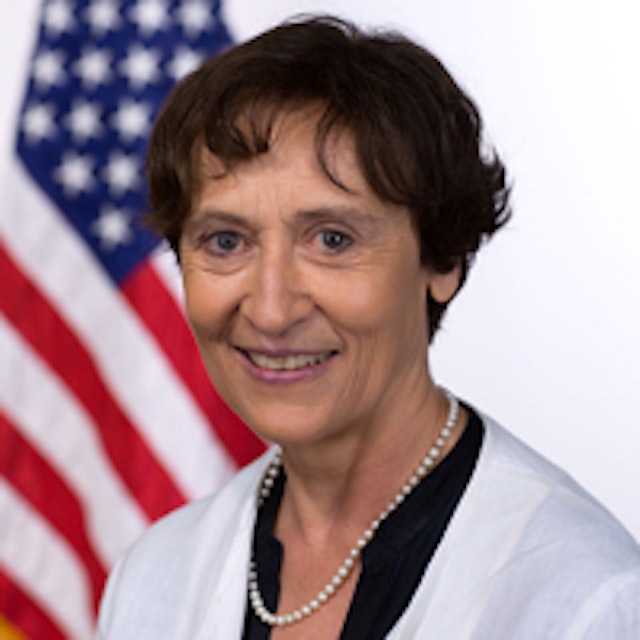The Google Transparency Project has so fari identified 258 instances of “revolving door” activity (involving 251 individuals) between Googleii or related firms, and the federal government, national political campaigns and Congress during President Obama’s time in office.

That included:
- 53 revolving door moves between Google and the White House. Those involved 22 former White House officials who left the administration to work for Google, and 31 Google executives (or from Google’s main outside firms) who joined the White House, or were appointed to federal advisory boards.
- 28 revolving door moves between Google and government positions involving national security, intelligence or the Department of Defense. Seven former national security and intelligence officials and 18 Pentagon officials moved to Google; while three Google executives moved to DoD.
- 23 revolving door moves between Google and the State Department during the Obama administration. Eighteen former State Department officials joined Google, while five Google officials took up senior posts at the State Department.
- 9 moves between Google and its outside lobbying firms and the Federal Communications Commission, which handles a growing number of regulatory matters with a major impact on the company’s bottom line.

The analysis included Google affiliates such as YouTube, related firms like Civis Analytics (whose sole investor is Eric Schmidt), as well as key law firms and lobbyists representing Google. [Below a detailed description of how we conducted our analysis]
Google has hired from throughout the top echelons of the policymaking world in Washington, including high-level White House officials. It also enjoys the benefit of having former executives moving into top positions in the administration that set policy on issues crucial to the company. Those include the Chief Technology Officer, a former Google executive, and key slots at the Office of Science and Technology Policy (OSTP). Former Googlers also occupy key positions at the National Economic Council and the U.S. Digital Service, a part of the Executive Office of the President.
The company has strategically hired from government agencies that have the greatest impact on its business, like the Federal Communications Commission and Federal Trade Commission. Google, or its main law firms, have hired several people from the Federal Trade Commission, an agency that has conducted investigations into the company’s conduct on privacy and antitrust grounds.
What the data suggest
Google’s hiring of government officials gives it valuable insight into the inner workings of government and politics. Having former Googlers steeped in its culture inside the government also gives it a formidable conduit to influence policymaking on a variety of issues affecting its interests.
The following breakdown illustrates the size and breadth of the traffic between Google and the U.S. government.

Megan Smith
1. The White House
- Senior Google executives have been appointed to several key federal advisory boards during Obama’s two terms including; Eric Schmidt and Google’s artificial intelligence chief Adrian Aoun (President’s Council of Advisors on Science and Technology); Google Evangelist Vint Cerf (National Science Board); and Google board member John Doerr (President’s Council on Jobs and Competitiveness and President’s Economic Board).
- In March 2016, Schmidt was appointed to his third advisory board under Obama, a new Pentagon board to provide the Secretary of Defense with advice on new technology.iii
- Several former Google executives also left the company to head up key White House positions on science and technology policy including Megan Smith (CTO); Amy Luers (Asst. Director Office of Science & Technology Policy); Alex Macgillivray (Deputy CTO); Nicole Wong (Deputy CTO); Janine Versi (National Economic Council); and Andrew McLaughlin (Deputy CTO).
McLaughlin was reprimanded in 2010 for using a personal email account for email exchanges with Google about White House policy matters in violation of restrictions on contacts with his former employer.iv - Former Google executives also dominate the ranks of the U.S. Digital Service, a new division within the Executive Office of the President that provides consulting on large federal IT projects. USDS and its affiliate division 18F count 18 former Google employees among their ranks, including USDS Head Mikey Dickerson, Dennis Gilbert, Nathan Parker and Eric Hysen. [See Story on U.S. Digital Service]
The moves from the White House to Google are also revealing. Those include:
- Several senior White House officials involved in national security and cybersecurity issues have joined Google since 2008. Deputy National Security Advisor Caroline Atkinson joined the company in early 2016 as its new head of global public policy. Others include Chris Finan (White House Director for Cybersecurity Legislation); Cybersecurity Director Sameer Bhalotra; and NSC Cybersecurity Director Will Hudson.
- Other notable moves to Google include, Thomas Lue and Aerica Shimizu Banks (OMB), Taj Wilson (White House Counsel); Sarah Cannon (NEC); and Matt Teper and Kyle O’Connor (White House speechwriters)

Caroline Atkinson
2. National Security and Defense
- DARPA’s senior director Regina Dugan joined Google in 2012 to head the company’s advanced technology and products division.
- Michele Weslander Quaid who served in senior positions at the Department of Defense, National Geospatial Intelligence Agency and the National Reconnaissance Office joined Google in 2015 as the company’s “Chief Innovation Evangelist”.
- Other moves include DARPA’s Jeffrey Rogers (Google Director of Engineering, Healthcare Technologies); DARPA’s Paul Eremko (Google Director of Engineering Advanced Technologies); CIA weapons analyst Nicole Menkhoff (Google HR); and CIA Technical Operations Officer Justin Schuh (Google InfoSec engineer).

Jared Cohen
3. State Department
One of the underreported stories emerging from Google’s close relationship with the Obama administration is the company’s deep involvement in foreign policy issues.Jared Cohen, who worked at the State Department under Hillary Clinton and who later joined Google as the head of Google Ideas (now called Jigsaw), helped draft the State Department’s “21-st Century Statecraft” Initiative, which called for using Internet and social media technologies to pursue diplomatic goals.
Eric Schmidt joined Secretary Clinton and other tech executives in 2010 at a dinner arranged by Cohen to discuss the use of technology for diplomatic purposes. Schmidt and Cohen have participated in officially sanctioned delegation visits to Iraq and other countries, as well as unofficial visits to countries like North Korea. The two have co-authored The New Digital Age,v an exploration of social media to further U.S. foreign policy interests.
In March 2016, The Wall Street Journal published an story examining the administration’s closely aligned actions ahead of the U.S. rapprochement with Cuba.vi Also joining Google from the State Department were:
- Scott Carpenter, a former State Department deputy assistant secretary and Kate Krontiris, a State Department advisor on innovation and technology joined Google Ideas in 2011.
- Vijay Padmanabhan (attorney); Sage Moon (Diplomat & policy analyst); and Michiel Perry (policy analyst) are other State Department officials who have joined Google.
- Ann Mei Chang, who led Google’s global product development for emerging markets joined USAID in 2013.vii Chang heads USAID’s Alliance for an Affordable Internet (A4AI), a public-private partnership to bring the other two-thirds of the world’s population online.
- Google is one of three global sponsors of the A4AI initiative along with USAID and the U.K.’s Department for International Development.viii The company has contributed over $1 million to the program.

Joshua Wright
4. Federal Trade Commission
Google has recruited top-level talent from the Federal Trade Commission, apparently in response to the FTC’s 2011 antitrust investigation into the company and ongoing investigations over antitrust issues related to Android and privacy matters. The company has hired several senior FTC attorneys and staffers directly while others have left government employment for Google’s top outside law firms.
- Former Commissioner Joshua Wright: Hired by Google’s top antitrust outside law firm, Wilson Sonsini Goodrich and Rosati, in January 2016. Wright was forced to recuse himself from working on Google issues during his time at the Commission because he co-authored papers, funded by Google, urging the FTC not to file suit against the company.ix
- Former Commissioner Julie Brill: Left the Commission in March 2016 to join Hogan Lovells, a law firm that has represented Google on several matters including antitrust, copyright and broadband spectrum issues.x
- Matthew Bye: A former FTC antitrust advisor, Bye left for Wilson Sonsini in 2010 and later Google where he provides legal counsel on federal and state antitrust investigations. Bye and Google’s top lobbyists and lawyers (including future Senator Ted Cruz) met several times in 2010 with Texas Attorney General Greg Abbot about the AG’s antitrust investigation.xi
- Robert Mahini: A former attorney in the FTC’s Office of General Counsel, Mahini left the Commission at the height of the FTC’s antitrust investigation in late 2012 to serve as Google’s senior policy counsel.
- Suzanne Michel: Former FTC counsel for intellectual property, Michel joined Google in 2011 as senior patent counsel.

Austin Schlick
Federal Communications Commission
Google’s business interests in telecommunications policy have spanned a range of key issues during Obama’s term in office. Google lobbyists have been frequent visitors at the Commission, seeking to gain an advantage in a range of rulings that affect its business, such as net neutrality, “white spaces”, privacy issues, spectrum reform, municipal broadband and the FCC’s current set-top box rulemaking.
Revolving door data shows six former FCC officials have joined Google’s payroll or that of its principal law firms during Obama’s time in office. Three others moved from Google to the FCC.
- While Google’s top lobbyist Johanna Shelton joined Google prior to Obama taking office, she served as an FCC attorney from 1998 to 2001.
- Renata Hesse, the Justice Department’s deputy assistant attorney general for antitrust, served as Google’s outside counsel at Wilson Sonsini before joining the FCC in 2011 as senior counsel for transactions. Google’s former lawyer in several antitrust matters, Hesse is tipped to become the Justice Department’s top antitrust official, replacing Bill Baer.
- Chanelle Hardy Reed who served as Commissioner Mignon Clyburn’s chief of staff, left the FCC this past December to do strategic outreach for Google.
- FCC Legal Advisor Austin Schlick joined Google in 2012 to serve as the company’s head of communications law.
- Colin Crowell, senior counsel to former FCC Chairman Julius Genachowski represented Google through his lobbying firm Crowell Strategies beginning in 2010.
The Google Transparency Project has compiled a database of every revolving door move it could find between Google employees and White House officials. We invite the public to explore the data and suggest stories for the GTP and interested journalists and researchers to pursue.
Revolving Door Methodology
Google revolving door data was compiled from an analysis of publicly available information such as LinkedIn profiles, news sources, lobby disclosure records, Open Secrets data and other web resources. It should not be considered a comprehensive tally, but rather an evolving representation of the scale of the revolving-door relationship between Googlei and government.
Analysts gathered data by searching for online profiles in which the term “Google” co-occurred with terms indicating government jobs such as “White House”, “Obama for America,” “Congress,” and the names of several administrative and independent agencies.
They searched Open Secrets’ “Revolving Door” page for instances of employees leaving government service for jobs with Google or vice versa. In as many instances as possible, analysts verified employment information and job start and end dates by searching for the name of the Google/government employee using publicly-available resources. The “source_url” field in the original dataset identifies the best available source of information about each revolving door job transfer.
Analysis of the data identified individuals who were either employees of the U.S. government or national political campaigns (Obama Administration, Congress, presidential campaigns, or Congressional campaigns) who were later employed by Google, or vice versa: they were employed by Google and related companies and subsequently employed by the U.S. government or political campaigns. The analysis included:
- Direct Moves: Defined as an employee moving directly from federal government or political campaign employment to employment with Google or vice versa – a Google employee moving directly to a job within the federal government or a political campaign. A move was considered “direct” if an employee’s LinkedIn profile did not list an interim position between her government post and there was no significant time gap between jobs.
- Indirect Moves: Employee held an interim position before joining Google from the federal government/political campaign or a position in the federal government before joining Google.
- Federal appointments to boards and commissions: Includes Presidential appointments to commissions such as the Presidents Council on Science and Technology or President’s Council on Jobs and Competitiveness.
In most instances only “revolving door” moves that occurred during President Obama’s two terms in office are included in the data. The exceptions are several Google employees who worked on the president’s first campaign in the 2007-2008 timeframe.
The dataset reflects up to three relevant positions in employees’ government service history. That is, the records for a government employee who served at both the White House and the Department of Defense before joining Google will show the move between the White House and the Department of Defense, and the move between the Department of Defense and Google.
The dataset also reflects movements between Google-affiliated entities such as Civis Analytics, whose sole investor is Eric Schmidt, and Tomorrow Ventures, Schmidt’s personal investment vehicle. Google employees who worked at both Google and Civis Analytics before joining the White House for instance will have records for their move between Google and Civis Analytics, and for their move between Civis Analytics and the White House.
Intern positions at either Google or the federal government were excluded from the analysis. See a problem with the data? Let us know at info@googletransparencyproject.org
Notes
i As of April 2016
ii Now a unit of Alphabet Inc.
iii http://www.defensenews.com/story/defense/innovation/2016/03/02/eric-schmidt-google-pentagon-ash-carter-advisory-board/81194738/
iv http://techpresident.com/blog-entry/white-house-deputy-cto-andrew-mclaughlin-slapped-gmailing-googlers
v http://www.amazon.com/The-New-Digital-Age-Reshaping/dp/1491512202
vi http://www.wsj.com/articles/google-and-obama-administration-connect-over-cuba-1458763836
vii While USAID is officially an independent government agency, its close coordination with the State Department warrants its inclusion here
viii http://a4ai.org/members/
ix http://fortune.com/2015/08/17/google-loses-its-friend-at-ftc/
x http://www.legal500.com/firms/2116-hogan-lovells-us-llp/52253-washington-dc-usa
xi https://www.yahoo.com/news/when-google-hired-ted-cruz--was-it-lawyering-or-lobbying-224937497.html



